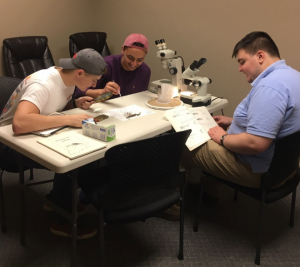Alexandru Rotaru ’22 — When people hear the term “public health,” most think of vaccines, health inspections, and PSAs that tell you what to do to prevent catching X disease. However, my experience as an EHS Fellow at the Montgomery County Health Department revolved more around the behind-the-scenes side of public health: data. My responsibilities included vector control and inspections – data collection –, plotting public health interventions and subsidized living units into a Geographic Information System (GIS, for short), and making sense of it – data entry and analysis –, and educating the population using the spoken and written word, through two articles, and three posters – acting based on the data. 
Vector control involved trapping and identifying mosquitoes to keep the population safe from West Nile Virus. Because we trapped daily, we had a lot of room to experiment and came up with hypotheses and research questions regarding where we would catch the most mosquitoes. Naturally, some of them were unfruitful, yet I feel more confident about making such hypotheses and testing them out in general, now that I have the experience of reaching dead ends before a breakthrough, which will help me in my career as a Chemist.
With GIS, I was tasked with plotting and cross-referencing subsidized homes through the HUD program with public health interventions, in order to identify any sort of vulnerable communities and correlations between different kinds of data. Through this project, I got a glimpse of just how much inter-agency effort is needed in order to maintain the health and safety of county residents. Communication is paramount when it comes to addressing issues in a community, and clearly defining roles and jurisdictions are key to effective collaboration.
On the education side, I wrote two articles – one addressing the community concerns and stigma around a sharps disposal program, and the other on how surveillance is the key to solving public health issues – and created three posters – one on proper sharps disposal, one on using a sharps clipper, and one on reducing the impact and breeding of mosquitoes in the home and community. Writing about public health was a challenge at first, as was creating a poster. It took a lot of patience, trial, and error, yet I feel more confident in those abilities, and I have become more realistic in my expectations regarding how difficult doing something familiar on an unfamiliar topic can be.
All in all, the biggest takeaway of this experience, besides working with data in public health, was that I have had the chance to explore all the different career paths related to public health, and further narrow down my future career path. I am thankful that the Global Health Initiative has offered me such an amazing opportunity, and I hope I will be able to use the skillset acquired through this internship during the school year and beyond.